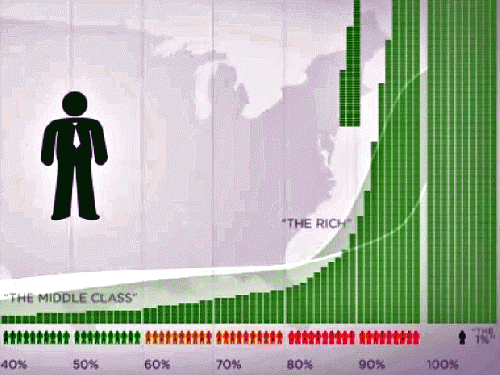| Back OpEd News | |||||||
|
Original Content at https://www.opednews.com/articles/Wealth-Disparity-and-the-B-by-Brian-Lynch-130616-375.html (Note: You can view every article as one long page if you sign up as an Advocate Member, or higher). |
|||||||
June 16, 2013
Wealth Disparity and the Brewing Social Crisis
By Brian Lynch
Wealth disparity, the number of people in poverty and the social stress that disparity causes are all growing but our understanding of how these things are actually related is not growing. Pundits and most of the main stream media aren't sounding the alarm. Instead they are echoing the false naratives that mask the real motivations driving this economy.
::::::::
Wealth disparity has a profound, relativistic impact in human societies and this is worth understanding. Even in the most egalitarian societies where everything is shared, there are subtle differences in the distribution of goods and services. These small differences convey powerful social messages that are keenly felt by all its members. These messages impact social interactions and the social order. Wealth distribution has powerful symbolic meaning in every society, large or small, rich or poor.
Wealth Disparity is Worse Than You Think by Business Insider
When actual material differences in wealth are subtle, the costs or benefits conferred by wealth distribution are limited to social perceptions and its impact on social order or governance. These material differences are not existential threats to the socially disadvantaged. However, as the actual material differences between members of society grows, the scarcity of essential resources for some may follow. This becomes ever more consequential as it increases the efforts needed to assure survival. It introduces more uncertainty and a loss of personal control. Distribution induced disparity can grow to the point where it can even become life threaten. Additionally, the social power differential grows to the point where social relationships of the advantaged towards the disadvantaged can become exploitive and extractive.
Under conditions of extreme wealth disparity there are physical and psychological impacts on both the powerful and less powerful. The Socially disadvantaged undergo significant stress and will exhibit all the symptoms and conditions associated with chronic stress (alcoholism, drug abuse, depression, maladaptive behaviors, obesity, child abuse, poor health outcomes, etc.). What is important to understand is that it is the disparity in wealth that induces social stress, not the absolute measure of wealth. Extreme wealth disparity becomes pathological in all societies, both rich or poor. This appears to have been true throughout history. Evidence of the corrosive effects of social disparity has even been demonstrated in research studying the impact of dominance on subordinate primate populations, so this appears to be a natural phenomenon.
Extreme wealth disparity is a threat to society. This fact is underappreciated by many. And distribution induced shortages don't need to be at starvation levels before reaching critical mass, especially in wealthy countries like ours. Pundits have used this starvation metric or comparisons of our poverty to that found in poor countries to dismiss the current threat we face from rapidly growing wealth disparity. A better measure of our social instability is the health and welfare of the nation's poor. The ranks of the poor are growing and their welfare is rapidly deteriorating. Here we find a conspiracy of silence in the main stream press. The symptoms of poverty induced stress have been reinterpreted as moral weaknesses and personal failings for which the poor have no one but themselves to blame. Both the unfair distribution of current wages and the redistribution of wealth through taxes to assist the poor are almost taboo subjects. To raise these issues is to be accused of inciting class warfare, which is exactly what has been raging for decades to bring us to this point.
The last time America experienced such enormous wealth disparity we were fortunate that the worst consequence was the Great Depression and not a total social collapse. The Great Recession of 2008 is an early warning of what will happen if we don't correct our current wealth imbalance. So far the alarm bells are ringing but the public address system is still on mute.
Authors Website: http://www.aseyeseesit.blogspot.com
Authors Bio:
Brian Lynch is a retired social worker who worked in the areas of adult mental health and child protection for many years. His work brought him into direct contact with all the major social issues of the day and many of our basic social institutions such as law enforcement, schools, hospitals, welfare agencies and private social service providers on both a local and state levels.
This was a privileged vantage point for him to observe every level of human ecology, from the lives of individuals to the operations of government institutions. He was struck by the impact of state and federal policies on the lives of ordinary people, for better or worse. Political conflict and the clash of ideologies has real, observable and sometimes devastating consequences. He now writes and blogs on topics that relate to his social observations.
